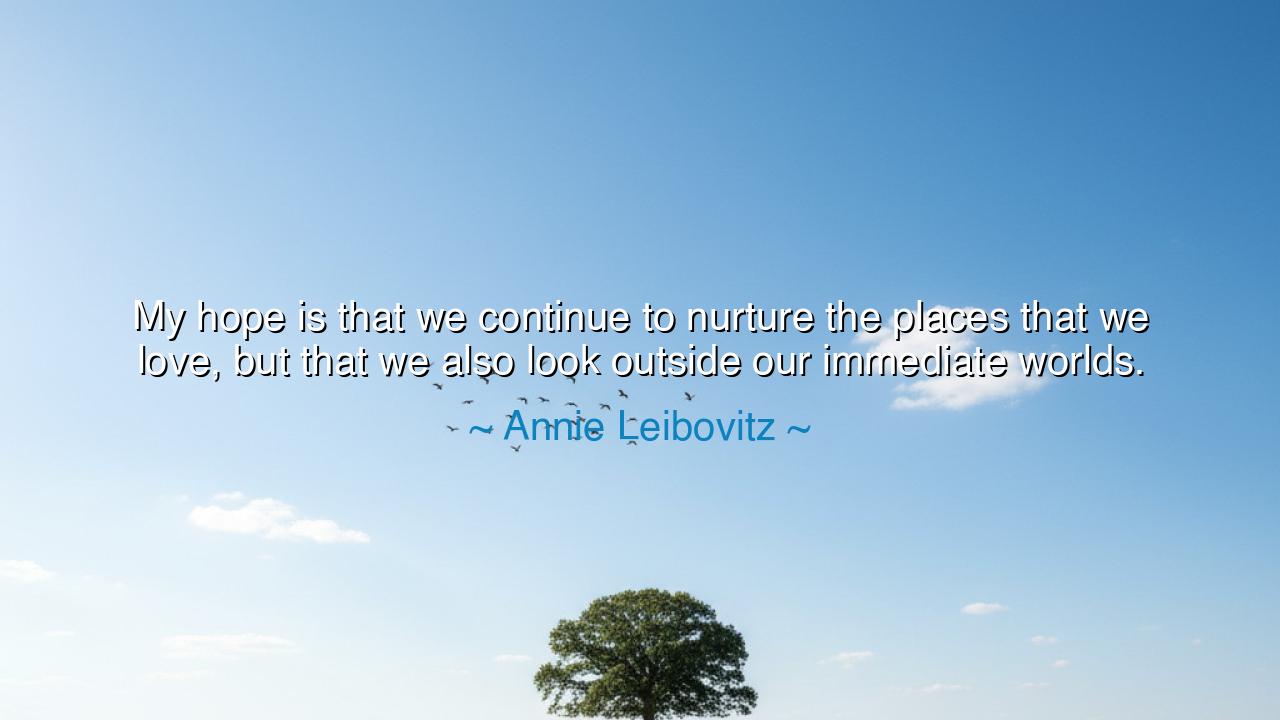
My hope is that we continue to nurture the places that we love
My hope is that we continue to nurture the places that we love, but that we also look outside our immediate worlds.






“My hope is that we continue to nurture the places that we love, but that we also look outside our immediate worlds.” — thus spoke Annie Leibovitz, the great photographer of souls, whose lens has captured the faces of ages and the fragile poetry of humanity. Her words, though spoken of art and the eye, reach far beyond photography. They are a call to balance, a summons to care deeply for what is near while daring to look beyond the horizon. For in this single sentence lies a wisdom as old as civilization: that love for one’s own world must never become blindness to the larger one, and that true vision embraces both the familiar and the far.
Leibovitz, born in the tumult of the twentieth century, learned early that art is both intimate and universal. Her career began in the pages of Rolling Stone, where she chronicled the spirit of a generation — the laughter, rebellion, and tenderness of youth. Yet, even as she captured those closest to her world, she was always gazing outward, seeking stories and faces that spoke of something greater than her own experience. When she says “nurture the places we love,” she speaks not only of the physical spaces — our homes, our communities, our traditions — but of the relationships and values that sustain us. To nurture is to protect, to feed, to honor. But her wisdom warns that love becomes shallow when it ends at the edge of one’s comfort.
The ancients, too, understood this truth. They taught that a man must first tend his own hearth before he can tend the city, and yet that the city, too, must not close itself to the world beyond its gates. Pericles of Athens loved his homeland deeply, but he also opened its walls to ideas from far-off lands, believing that the greatness of a people is measured not only by what it preserves, but by what it learns. So too does Leibovitz remind us that the heart and the horizon must walk together. One who clings only to the familiar becomes stagnant, but one who abandons the familiar loses root and meaning. Balance is the path of wisdom — the middle way between devotion and discovery.
Consider the story of Jane Goodall, the naturalist who began her life among the forests of Tanzania, nurturing the world of chimpanzees with love and patience. For years she tended her “immediate world,” studying and protecting her small corner of nature. But as her understanding deepened, she began to speak to the entire world about conservation, compassion, and responsibility. Her love for one forest grew into a voice for the planet itself. In her journey we see Leibovitz’s wisdom made flesh — that true care for one place leads naturally to care for all places, for the boundaries between them are illusions of the mind.
In a deeper sense, Leibovitz’s quote is also about vision and empathy — the artist’s eternal calling. To “look outside our immediate worlds” is to see with the eyes of the spirit, to seek understanding where others see only difference. It is to look beyond the skin, the language, the culture, and to find the shared humanity beneath. Every photograph Leibovitz takes is, in its way, a bridge — connecting the personal to the universal. The ancient sages would have called this the pursuit of the “great harmony,” the unity that holds all things together despite their diversity. To nurture what we love is to keep our hearts anchored; to look beyond is to keep our souls alive.
Yet her words also carry a gentle warning. The modern world is filled with noise — each person trapped in the small sphere of self, each nation nursing its own pride. When we care only for what is ours, we become blind to the suffering and beauty beyond our walls. The love of one’s home becomes selfishness; the defense of one’s truth becomes isolation. To heal the world, we must begin where we stand, yes — but then we must reach outward, extending that same care to the unknown. Just as a tree draws strength from its roots but spreads its branches toward the sky, so too must our compassion expand beyond our immediate world.
Therefore, O listener of tomorrow, remember this sacred teaching: Love what is near, but do not be bound by it. Tend to your family, your community, your craft — let your care be real and grounded. But then lift your gaze, and let your heart travel. Learn from the stranger, the distant, the unfamiliar. Seek the unity beneath difference, and let your love become wide as the world. For as Annie Leibovitz reminds us, only by nurturing what we love and looking beyond ourselves can we fulfill the highest calling of the human spirit: to live not as isolated beings, but as citizens of the earth, connected in wonder and compassion to all that lives and breathes.






AAdministratorAdministrator
Welcome, honored guests. Please leave a comment, we will respond soon